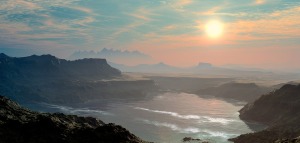
Some statements of philosophers are so transcendent, and so soaring in imaginative power, that they require little or no comment. I found one such passage today in a book that in recent years has come to be one of my favorites: Pascal’s Pensées. I love Pascal because I can open his book at random, any time I feel the need, and feel his spiritual fingers gripping my throat with every sentence. He is not only a philosopher, but a saint.
Here is Pascal, in all his mystical and evocative power, discoursing on the place of man in the cosmos. (This passage is taken from Dr. Roger Ariew’s 2005 translation, pp. 58-59)
Let man then contemplate the whole of nature in its lofty and full majesty, and let him avert his view from the lowly objects around him. Let him behold that brilliant light set like an eternal lamp to illuminate the universe. Let the earth seem to him like a point in comparison with the vast orbit described by that star.
And let him be amazed that this vast orbit is itself but a very small point in comparison with the one described by that star. And let him be amazed that this vast orbit is itself but a very small point in comparison with the one described by the stars rolling around the firmament.
But if our gaze stops here, let our imagination pass beyond. It will sooner tire of conceiving an imperceptible trace in the amplitude of nature. No idea approaches it. However much we may inflate our conceptions beyond these imaginary spaces, we give birth only to atoms with respect to the reality of things. It is an infinite sphere whose center is everywhere and circumference nowhere.
In the end, the greatest perceptible sign of God’s omnipotence is that our imagination loses itself in this thought.
Let man, returning to himself, consider what he is with respect to what exists. Let him regard himself as lost in this remote corner of nature, and from the little cell in which he finds himself lodged, I mean the universe, let him learn to estimate the just value of the earth, kingdoms, cities, and himself.
But what is a man in the infinite? But to present him with another equally astonishing prodigy, let him examine the most delicate things he knows. A mite with its minuscule body shows him incomparably more minute parts, legs with joints, veins in its legs, blood in its veins, humors in this blood, drops in the humors, vapors in these drops. Let him divide these last things again until he exhausts his powers of conception, and let the final object to which he can now arrive be the object of our discourse. Perhaps he will think that this is nature’s extremity of smallness.
I want to make him see a new abyss in there. I want to depict for him not just the visible universe, but the immensity of nature we can conceive inside the boundaries of this compact atom. Let him see there an infinity of universes, each with its firmament, its planets, its earth, in the same proportion as in the visible world; and on this earth animals, and finally mites, where he will find again what he saw before and finally still in the others the same thing without end and without cessation.
Let him lose himself in wonders as astonishing in their minuteness as the others are in their extent! For who will not marvel that our body, imperceptible a little while ago in the universe, itself imperceptible inside the totality, should now be a colossus, a world, or rather a whole, with respect to the nothingness beyond our reach?
Whoever considers himself in this way will be afraid of himself, and, seeing himself supported by the size nature has given him between these two abysses of the infinite and nothingness, he will tremble at these marvels. I believe that, as his curiosity changes into admiration, he will be more disposed to contemplate them in silence than to examine them with presumption.
For in the end, what is man in nature? A nothing compared to the infinite, and everything compared to the nothing, a midpoint between nothing and everything, infinitely removed from understanding the extremes: the end of things and their principle are hopelessly hidden from him in an impenetrable secret.

Read More: Jack London Sails Across The Pacific



You must be logged in to post a comment.